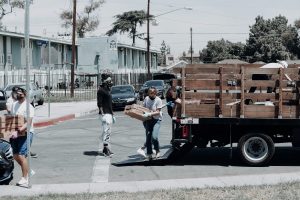
COVID-19 will shut down our entire system. It will force us to build a new, just, and caring one instead. It may be a biological virus, but we are biological machines. And just as a computer virus changes how the computer works, the biological virus changes how we work. But unlike computer viruses, this one didn’t come to ruin us; it came to reprogram us, to fix the bugs in our system, to make us not only human, but caring and humane—to each other, to the planet, to posterity.
The coronavirus has revolutionized our lives. In the first wave, we sheltered in place and watched in awe as nature immediately blossomed. Then we rolled back the lockdown, resumed fighting and bickering, and nature retreated. But then the virus became more aggressive and more infectious, telling us that we will pay if we don’t obey.
The virus is telling us that it sent us home because we didn’t keep our distance and didn’t cover our faces. Where people obey, as in China, the virus has significantly eased its pressure. Where people are rebellious, as in the U.S. and Israel, the virus is wreaking havoc.
The coronavirus is leading us toward a far deeper change than we can see. Step by step, it is transforming our nature—from self-centered entitlement to giving and caring. This is why I don’t see the virus as a blow or a great disaster, but as a gift from nature to teach us how to build a sustainable and happy society that lives on a thriving planet.
Even the fatality rate from COVID-19 does not warrant it the title “disaster.” When you think of all the accidents that were prevented, the decrease in the damages from air pollution, the improvement in the water quality, and the myriad other benefits that staying at home has given us, it’s hard to see the lockdown as a punishment. Quite the contrary, it is a blessing.
I also don’t view the economic shutdown as a catastrophe, but as nature’s last resort to save us from destroying our home planet. The fact that people can’t buy food or pay rent is not because of the virus, but because of the draconian economic system that we built. Capitalism is an obsolete paradigm, and the sooner we transition from it, the better for all of us.
Tomorrow’s economic paradigm is one of mutual care and concern. It is not communism, where everyone is ostensibly equal but in fact they’re not. It is not based on the premise of equality of people, but on the premise of empathy among us, and that makes all the difference.
Humanity can provide several fold the amount of food and other staples required for comfortable living for everyone. The only reason there are still deficiencies is that we don’t care about each other, so when there is surplus production in one place, we spill it or trash it to keep the price high instead of delivering it where it is needed. All we think about is our profit, and those who can’t pay can starve to death. In today’s world, can we consider such an attitude as morally right? It is a testimony to our disconnect from one another.
Unless we change of our own volition, the coronavirus will change us. The new era of mutual responsibility has already begun; we join the merry ride, or be dragged into the band wagon until we realize it is all to our benefit.